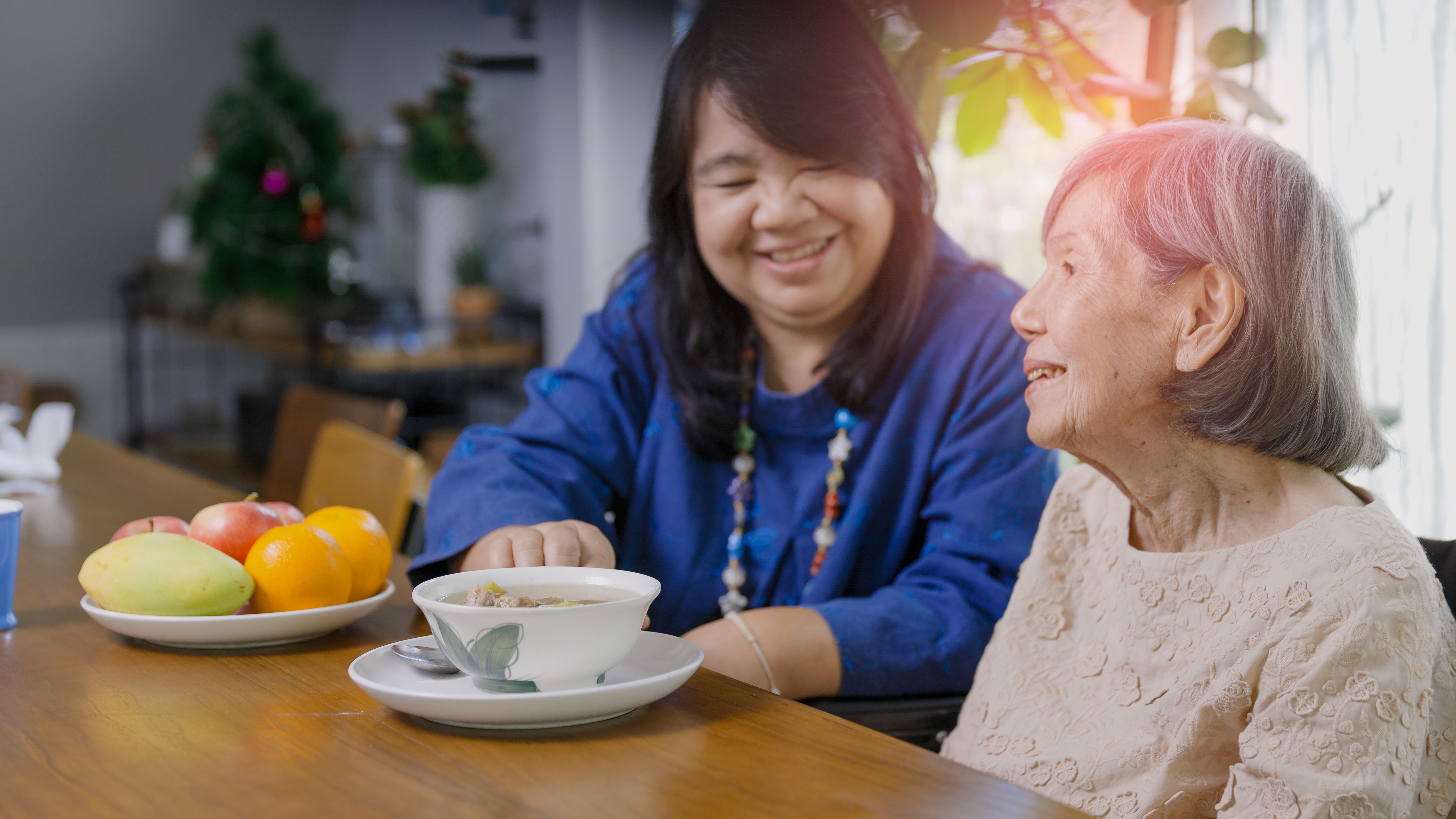Caregiver Wellness
Take care of your own mental and physical wellness through these support channels for caregivers.
- Remember to Take Care of Yourself
- Caregiver Support
- Useful Caregiver Guides
Remember to Take Care of Yourself
Physical Wellbeing

Care receivers often have specific needs at night. Some may need a frequent change in their body positions to prevent disuse syndrome. Others may have limited mobility while needing regular visits to the toilet. These can lead to caregivers having interrupted sleep over several months. When it all adds up to an extreme fatigue, that’s known as sleep debt.
Like any other debt, a sleep debt needs to be paid back, and the only way to do it is to catch up on lost sleep. You should ideally get at least 7 hours of sleep every day. If that’s not possible at night, try to find time to sleep during the day.
Physically supporting care receivers who have limited mobility is also a literal strain on caregivers, whether it’s helping them into and out of wheelchairs or supporting them as they climb up stairs. It might be a good idea to jog or hit the gym regularly to keep your muscles healthy and your energy levels high. Every workout will leave you feeling more energized and empowered to perform your responsibilities.
In stressful periods, you may be tempted to indulge in unhealthy food such as sugary or deep-fried items. Don’t. A balanced diet with sufficient nutrients of all kinds is important to keep you healthy.
Emotional Wellbeing
Did you know that caregivers are at increased risk of stress, burnout and depression compared to the general population? The event of a loved one becoming newly ill, injured or disabled is a major shock to begin with. On top of that, when you are the one entrusted with physically and emotionally supporting them, the emotional load can pile up.

There are several ways to manage your substantial emotional burdens. Try yoga, tai chi, meditation, breathing exercises or relaxing music. In other words, anything that gives you inner calm. Make it part of your daily life. You’ll feel the difference.
Sometimes, just talking out your feelings with a loved one can help you feel much better. Don’t deny your feelings. Get in touch with them. Express them. Allow yourself to cry if necessary. Remember that it’s ok to not be ok.
Don’t underestimate the importance of the living environment in determining how you feel. A safe, hygienic, comfortable and cheerful home environment can do wonders for your morale as a caregiver, and for the wellbeing of the care receiver of course.
Knowledge
One of the biggest sources of stress for a caregiver is the gnawing feeling that you’re out of your depth and you don’t actually have the knowledge necessary for your tasks. This is often called impostor syndrome.
The best way to deal with this is to keep equipping yourself with the knowledge you need. Seek training specific to the medical conditions and everyday needs of the care receiver. Join support groups where you can learn from the experiences of other caregivers while sharing your own.
Consult with medical professionals as frequently as necessary. Feel free to augment your knowledge with online research, but make sure you double-check and triple-check your information and ensure that it comes from reliable sources such as reputed hospitals, doctors and scientists.
Don’t think you have to do everything yourself. Two heads are often better than one. Chances are, there might be other loved ones of the care receiver who are also emotionally invested in their wellbeing. Communicate openly and frequently with them. If no such person exists, enlist a friend of yours to assist you.
Time and Money Management
It’s not just about the medical knowledge. A caregiver also needs to be skilled at managing time and money.
Newfound caregiving responsibilities can impose a strain on your schedule. It can be hard to juggle a career with caregiving duties. Have a chat with your workplace so that you can tweak your schedules and/or take time off whenever necessary. Also manage expectations with the care receiver regarding how much time you can spend with them.
If the caregiver is your family member, or a friend without sufficient finances to support themselves, you’ll also face new financial burdens in addition to the physical and emotional ones. Plan ahead to ensure sufficient finances for every possible expense (medical or otherwise). If the care receiver is physically or mentally not in a state to manage their bank accounts or pay their bills regularly, you’ll have to help them with those practicalities too.
Here are some possible sources of financial relief you can explore: Finance Resource
Caregiver Support
Agency for Integrated Care (AIC)
Find out more about how to build a support network within your family, the right professionals to assist you, and the skills and training you need.

1800 650 6060
Caregivers Alliance
A non-profit dedicated to helping caregivers of persons with mental health issues through education, support networks, crisis support, tailored services and self-care enablement.

6460 4400
Caregiving Welfare Association
Monthly caregiver support group sessions to share personal experiences and learn from those of other caregivers.

6466 7957/ 6466 7996/ 6734 2991
Dementia Singapore Caregiver Support Groups (CSGs)
Share caregiving experiences and practical tips, learn about dementia, and discover resources in a safe and relaxed environment.

6377 0700
DementiaHub.SG Caregiver Support Groups (CSGs)
A private and safe environment for caregivers to share their thoughts, challenges and learnings with one another.

6377 0700
Grief Matters
Support, advice and information to the bereaved in the event that a loved one passes on.

8181 0448
National Council of Social Service (NCSS)
The NCSS has prepared the “Who Cares?” publication and the “We Care” toolkit for caregivers that you can download from their website.

6210 2500
Silver Caregivers Co-operative
A social enterprise that aims to better the quality of life of caregivers through workshops, courses, talks and information about caregiving.

6407 7360, 9830 3165
SupportGoWhere
Caregiver support groups and helpline to support caregivers of persons with dementia.

6377 0700
TOUCH Caregivers Support (TCG)
A support group that helps caregivers cope with the challenges of providing care to their loved ones, through a range of support services including a helpline, caregiver training, home modifications and home care services.

6377 0122









